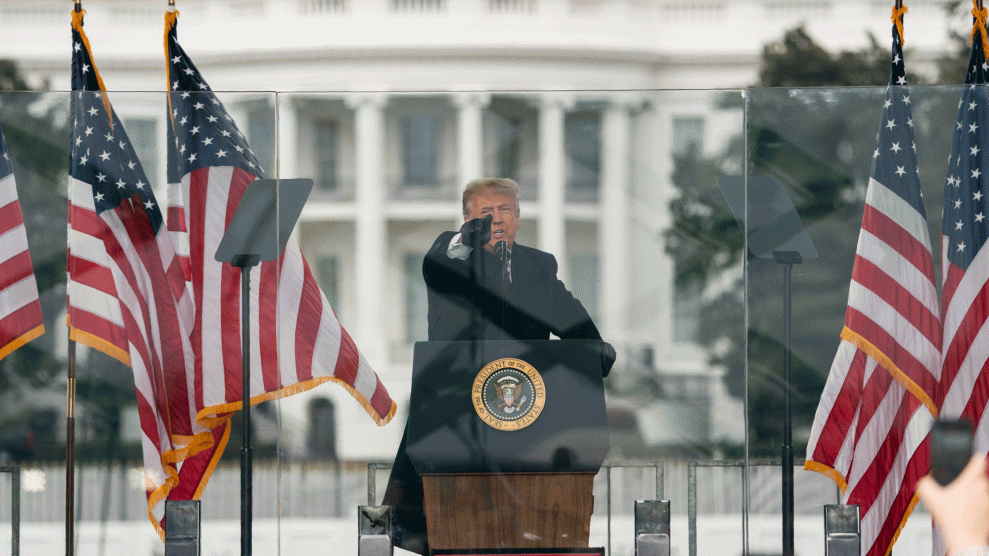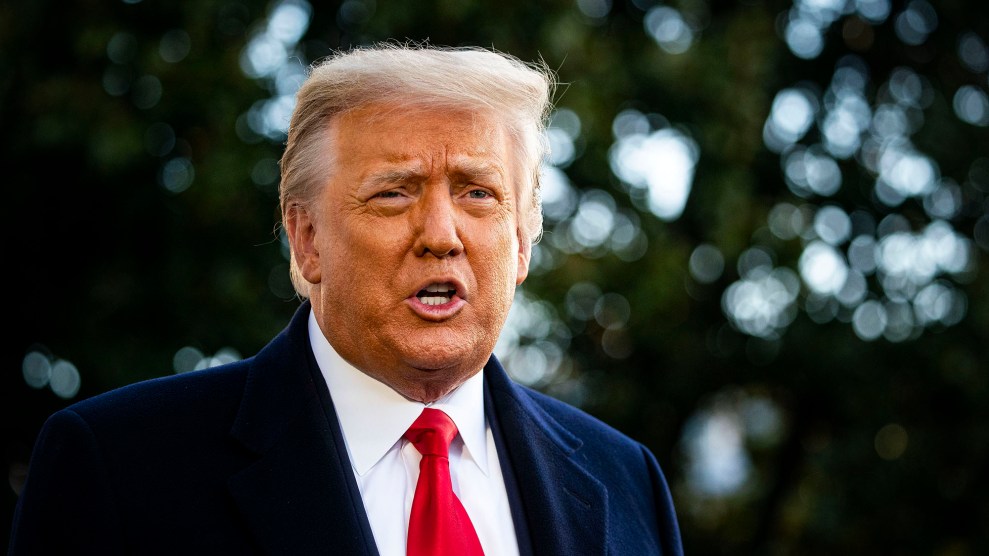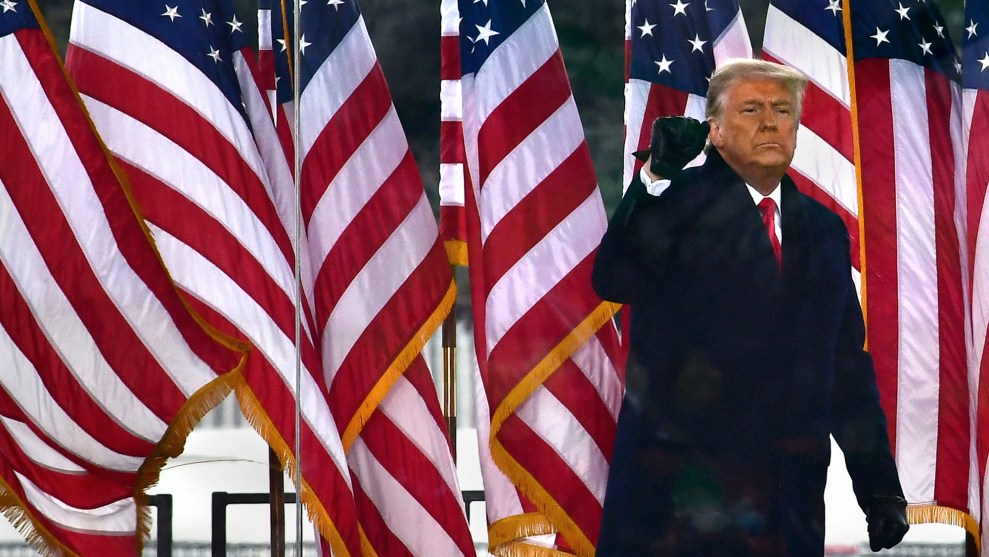
Evan Vucci/AP
The second time around is often not as exciting as the first. The novelty is not there. The thrill is gone. When Donald Trump was impeached by the House of Representatives and placed on trial about a year ago, that was a historic occasion. Only two prior presidents had been indicted by the House and tried by the Senate. Many Americans had never before witnessed this rarely used constitutional mechanism in operation. Now, as the Senate convenes a trial for Trump’s record-setting second impeachment—which charges him with “incitement of insurrection”—there may oddly be a touch of the ho-hum to the endeavor. In standard terms, the stakes are not as high as they are for the usual impeachment trial. Trump has already been extricated from the White House by the American voters. Though a conviction could lead to the passage of a measure prohibiting Trump from seeking a return to the presidency, once more it appears Republican senators will largely stand by Trump as the leader of their party-turned-cult-of-personality. So the outcome again appears predetermined.
Yet despite the deja-vu-ness of this been-there/done-that impeachment and the absence of a possible political death sentence, the second Trump impeachment is far more important than the first, for it ultimately is about securing and protecting the defining ideal of the United States: that this nation is a democracy that honors principle not power.
Trump Impeachment I was indeed drop-dead serious. At issue was a significant presidential abuse of power. Trump had attempted to use his office improperly to gain a political advantage. Operating like a Mafia don, Trump leaned on the newly elected president of Ukraine to launch a phony investigation that would target Joe Biden and another bogus probe that would essentially clear Moscow of the proven charge it had intervened in the 2016 election to help Trump.
The first impeachment fixed on this one discrete act, which was chronicled by a smoking-gun quasi-transcript of the call between Trump and the Ukrainian leader. With this evidence in their mitts, House Speaker Nancy Pelosi and her fellow Democratic leaders of that chamber opted to not pursue a wider impeachment charge against Trump. In his final report, Special Counsel Robert Mueller had offered a detailed roadmap for an impeachment case based on several alleged acts of obstruction of justice related to the Trump-Russia investigation. Yet the Democrats favored a skinny approach: focus on one obvious instance of an abuse of power. It was much like a prosecutor attempting to nab a crime boss by concentrating on a single illegal act for which the proof was rock-solid. Trump was not impeached for his overall assault on the rule of law. His Ukraine caper, though, did evince his dangerous authoritarian impulses, his desire to inappropriately (if not illegally) influence an election, his debasement of the office of the president, and the threat he posed to democratic stability. Still, one had to draw these conclusions from the details of this particular corrupt action.
Impeachment II requires no such extrapolation. The core issue is a president jeopardizing American democracy. For the first time since the republic was born, the United States did not experience a peaceful transfer of power following a presidential election. (Yes, there’s an asterisk for the 1860 election of Abraham Lincoln that led six months later to the Civil War.) Trump spent weeks prior to the election plotting how to subvert it should he lose, and then he put his scheme in motion, pushing the big lie that massive fraud had occurred and a nefarious cabal had stolen his victory. He falsely declared victory before all the votes were counted. He and his allies refused to accept legitimate and certified results, filing frivolous lawsuits that were routinely tossed out and spreading baseless conspiracy theories. They lied—over and over—about vote tallies and supposed irregularities that did not exist. It was a psyop campaign, information warfare—similar to the covert attack waged against the 2016 election by Vladimir Putin. And evoking his infamous Ukraine phone conversation, Trump called Georgia state officials and pressured them to “find” him just enough votes to secure a victory in that state. Coercing local officials to falsify election results can be a crime.
This all happened before the seditious and murderous attack on the US Capitol on January 6. For months, Trump had waged war against the election and the American political system, seeking to discredit it so he could retain power, misleading millions of America, and exploiting paranoia, fear, and political division. His impeachable acts did not begin on that dreadful day. “The full story is a crime story, a long crime story,” one of the House impeachment managers tells me. The attack on Congress—which aimed to overturn the election results—was the product of a lengthy stretch of disinformation and incitement.
The case is not merely about what Trump said at a rally immediately before the protesters he had called to Washington for a “wild” day—a rage-fueled mob that included neo-Nazis, Christian insurrectionists, and white supremacists—marched on Capitol Hill and raided a citadel of American democracy. Nor is it just about what Trump in the White House did as the brownshirts he had riled up overran the Capitol, called for the deaths of Pelosi and Vice President Mike Pence, and killed a police officer, while seriously injuring scores of others, who were literally placing their bodies on the line for democracy. (Trump reportedly watched the rampage with excitement, perhaps hoping it would achieve the strategic aim he and his lawyer Rudy Giuliani were then chasing: delaying Congress’ certification of the electoral votes.) Nor is it only about Trump’s effort that day to pressure Pence to take the unconstitutional step of blocking that certification. Trump’s disgraceful actions on January 6 were the endgame of a conspiracy against the United States he had been pursuing for months.
Trump had betrayed the nation—as he had before. (See the COVID pandemic.) He had sought to delegitimize an election. He had encouraged a violent insurrection. He did nothing at first when domestic terrorists assaulted Congress. Trump’s Ukraine phone call was a minor instance of sleaze compared to this crusade of full-scale treachery—like Al Capone’s tax evasion compared to his entire criminal villainy. And even if Trump is now out of office, his impeachment and trial remain vitally necessary. His attempt to undermine democracy demands investigation and judgment. Future chief executives need to know that they will not have a free pass to take a last-minute stab at clinging to power through skulduggery and terrorism. And members of Congress—now and in the years to come—ought to be taught that they are accountable for holding a power-grabbing, sedition-pushing president responsible for such sins against the republic. This impeachment does not only place Trump in the dock; it puts Republicans in a harsh spotlight. This is a test for them. Will they allow Trump’s democracy-endangering actions to go unpunished? And as the House impeachment managers chronicle Trump’s wrongdoing, as well as the awful details and tragic casualties of January 6, they will serve a much-needed purpose: providing the public with its first extensive look at the Tump-incited horrific event that merits further investigation by Congress and other bodies.
Then there is the matter of Trump’s legacy. He warrants an appropriate send-off. Presidents come to be defined in shorthand. Lincoln won the Civil War and ended slavery. Washington relinquished power. Nixon resigned. Trump will forever be twice-impeached—a distinction that will be especially meaningful if it is noted that the second one was in response to his attack on the nation’s democratic foundation. It is improbable that 17 Republican senators will join the Democrats to convict Trump at this latest trial. But a majority of the Senate will likely vote against Trump, and that will tarnish Trump as a president who, in the eyes of most members of Congress, ended his term as an enemy of the state. Whatever Trump’s political future, this will become an impossible-to-undo part of his brand—a disgraceful foe of constitutional government.
Trump is the first president to threaten American democracy in such a direct, profound, and violent manner. And this impeachment is no retread. It may lack suspense. It may seem to some as a going-through-the-motions exercise with an easy-to-predict conclusion. It may cut against the sentiment of those who want to move past Trump. But Trump committed one of the greatest political crimes in American history, and that deserves a full reckoning—for now and for the future.








